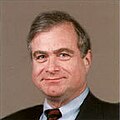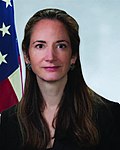Deputy National Security Advisor
Executive position in the United States of America From Wikipedia, the free encyclopedia
The United States Deputy National Security Advisor is a member of the Executive Office of the President of the United States and the United States National Security Council, serving under the President's National Security Advisor.
| Deputy National Security Advisor | |
|---|---|
 | |
| Executive Office of the President | |
| Member of | National Security Council Homeland Security Council |
| Reports to | President of the United States United States National Security Advisor |
| Appointer | President of the United States |
| Constituting instrument | National Security Presidential Memorandum[1] |
| Formation | 1961 |
| First holder | Walt Rostow |
| Website | wh |
Among other responsibilities, the Deputy National Security Advisor often serves as Executive Secretary to the National Security Council Principals Committee, and as chairman of the National Security Council Deputies Committee. The role changes according to the organizational philosophy and staffing of each White House and there are often multiple deputies to the National Security Advisor charged with various areas of focus.[2][3]
The position is held by Alex N. Wong, who assumed office on January 20, 2025. He is titled as Principal Deputy National Security Advisor.
List of Principal Deputies
List of Additional Deputy National Security Advisors
Summarize
Perspective
Aside from the principal deputy, since the September 11 attacks, there have been some cases of other deputy-level positions created with an additional specifier title and alternate role. These include:
- Wayne A. Downing (2001–2002) for Combatting Terrorism
- David McCormick (2006–2007) for International Economic Affairs[5]
- Michele Davis (2005–2006) for Strategic Communications
- Corry Schiermeyer (2006–2007) acting for Strategic Communications
- Mark Pfeifle (2007–2009) for Strategic Communications
- Juan Zarate (2005–2009) for Combating Terrorism
- Elliott Abrams (2005–2009) for Global Democracy Strategy
- John O. Brennan (2009–2013) for Homeland Security
- Ben Rhodes (2009–2017) for Strategic Communications
- Caroline Atkinson (2011-2015) for International Economic Affairs
- Lisa Monaco (2013–2017) for Homeland Security
- Wally Adeyemo (2015–2016) for International Economics[6]
- Dina Powell (2017–2018) for Strategy
- Nadia Schadlow (2018) for Strategy
- Victoria Coates (2019–2020) for Middle East and North African Affairs
- Elizabeth Sherwood-Randall (2021–2025) for Homeland Security & Counterterrorism
- Anne Neuberger (2021–2025) for Cyber and Emerging Technology
- Daleep Singh (2021–2022) for International Economics
- Mike Pyle (2022–2024) for International Economics
- Daleep Singh (2024–2025) for International Economics[7]
References
Wikiwand - on
Seamless Wikipedia browsing. On steroids.






























